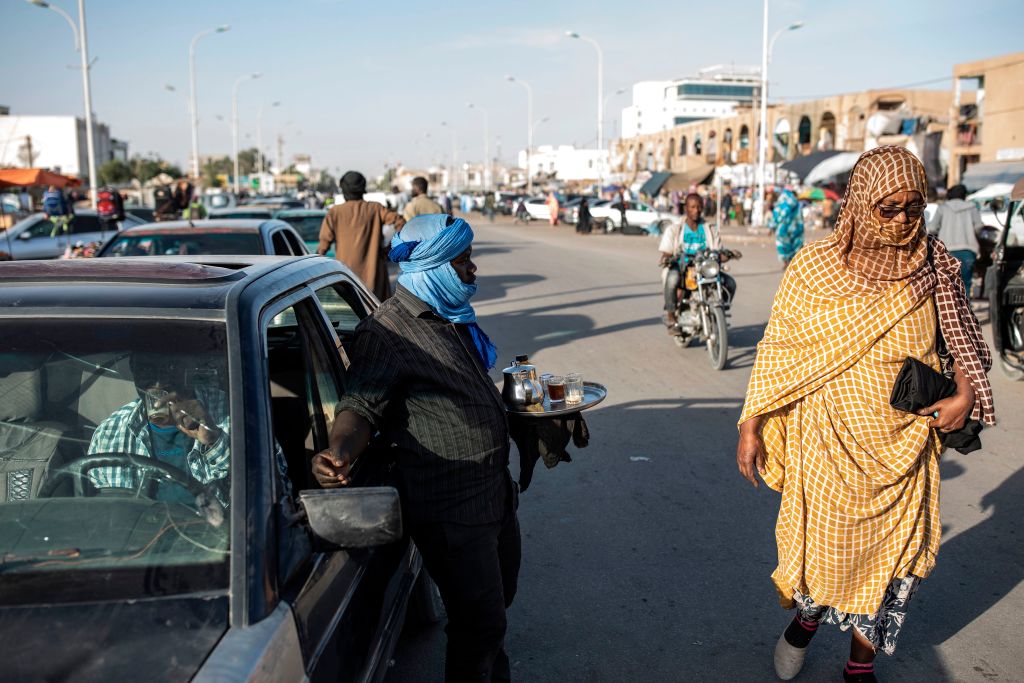Nouakchott in Mauritania is often referred to as the “worst capital city in the world.” That may be a little harsh, but it is difficult to recommend it to Spectator readers as a must-visit destination. The heat is savage, the poverty endemic, corruption is off the scale and this west African country is one of the last on Earth where you can still find hereditary slavery. Which is why I’m here. Troubles begin on arrival. A succession of three police officers grill me in the airport. Why have I come to Nouakchott, who am I working for, who am I planning to meet, why, what are their telephone numbers, what am I going to talk to them about, where am I staying? They are flummoxed by the word “historian.” It’s best not to say I’ve come to research a final chapter for a history of slavery in the Islamic world. Governments here routinely deny slavery still exists and persecute and imprison those who take a stand against it.
One of those regularly harassed is Biram Dah Abeid, a charismatic anti-slavery campaigner who for several years has been a thorn in the government’s side. “I’ve been imprisoned five times,” he tells me — once for protesting against a court’s decision to drop charges against a man who had raped his fifteen-year-old slave girl. In an illustration of justice à la Mauritanienne, the pregnant girl was later charged with having sex outside marriage, a crime under the prevailing sharia law. Habi Rabah is waiting for us in her tiny breezeblock and corrugated metal home on the city’s margins. Here, in a sweltering no man’s land of plastic trash and the odd stinking donkey carcass, the drifts of sand are so deep you can’t even get a four-wheel-drive through. Enslaved as a child, Habi was raped and regularly beaten by her master and owner from the age of nine. Looking after the goats in the desert all day, she returned home exhausted to take care of the family’s children. In 2008, she was liberated by Biram Dah Abeid’s anti-slavery organization and has never looked back. She has even run for parliament twice, so far unsuccessfully. “I came to realize I hadn’t been living before,” she says. “For the first time I started to taste life. Before that I was just an object. I didn’t exist as a human being. Now, praise God, I am free.”
Next up, a quick stop off in Kyiv to launch Sirens of Hope, a book which pays tribute to the Ukrainian medics of MOAS, a remarkable charity which has saved 45,000 lives and counting on the medical front line. Last summer, Lieutenant Oleksandr “Biker” Voznyi was commanding a platoon during an attack near Zaporizhzhia. A shell exploded two meters away from him, shredding his lungs, spine and limbs. After he lost large quantities of blood and suffered seven cardiac arrests, his comrades were sure he wasn’t going to make it. But Stanislav and Volodymyr, the MOAS medics, reckoned he had a chance. They performed desperate CPR on him for twenty-five miles. Today he’s on the mend, undergoing intensive rehabilitation therapy and determined to rejoin his unit on the front line. When he is introduced on stage for the first time to the men who saved his life, he is in tears, his wife is in tears, we are all in tears. “Every life saved keeps Ukraine in the fight,” he says. Readers who wish to support this extraordinary, life-saving charity can find out more at moas.eu.
I’m in love with my Italian publishers. After toiling away in Nouakchott and Kyiv, an invitation to speak about Herodotus in Rome, Siena and Calabria is a no-brainer. Edizioni Settecolori usually publishes dead writers in translation: Ernst Jünger, Nadezhda Mandelstam, Wilfred Thesiger and many more. I’m the first warm body. Within a couple of days, Manuel Grillo, my recklessly generous publisher, has already spent more on entertaining my wife and me than on purchasing the book. Six days pass in a whirlwind of heavily lubricated lunches and dinners, a high point of which is morzeddhu catanzarisa, a mind-blowing veal offal specialty of Catanzaro. Manuel and his colleague Stenio Solinas, a man of letters with a natty line in tailored linen shirts with collars in a 1930s Italian Riviera style, even drive us halfway across Calabria to visit the spectacular Riace bronzes, full-size statues of naked bearded warriors from around 450 BC. These embarrassing levels of Italian hospitality remind me of a line from Thesiger’s Arabian Sands: “I have wondered sadly what Arabs brought up in this tradition have thought when they visited England and I have hoped that they realized that we are as unfriendly to each other as we must appear to be to them.”
Many years ago, while writing a book about Herodotus, I imagined the Persian king Darius the Great’s wife Atossa giving her husband oral sex.
The suggestion, hinted at by the Greek historian, was that she was stiffening her husband’s resolve to invade Greece. The highlight of the evening in Certosa di Maggiano, a fourteenth-century Carthusian monastery turned hotel just outside Siena’s city walls, is a riotous encounter with Professor Duccio Balestracci, an irrepressible historian who spends several minutes retelling the oral sex story. Wherever we go, national and local media feature the book events in a way difficult to imagine in Britain unless, perhaps, you’re J.K. Rowling. The joke goes down well. The headline in Corriere di Siena: “Marozzi, Balestracci and Solinas enchanted the audience.” I suddenly feel very Italian. Questa è la mia gente, these are my people!
This article was originally published in The Spectator’s September 2024 World edition.


























Leave a Reply